This summer, federal policy changes allowed new flexibility for how free summer meals could be distributed to kids and teens in rural communities throughout the country. Parents and caregivers were offered flexible new options like grab and go meals, meal delivery and pick-up of multiple meals at a time. This opened the door for many families who formerly did not have access to summer meals due to barriers like transportation, fuel costs, extreme weather and parent’s work schedules.
Bledsoe County, Tennessee–situated about midway between Nashville, Knoxville and Chattanooga–is a prime example of the impact these new flexibilities are having in rural communities. Bledsoe County Schools switched to a “grab and go” program this summer, a model proven successful during the COVID-19 pandemic. Nutrition Director Dianne Campbell and her team distributed 7 days of meals each week over the course of 5 weeks, providing around 1,400 children and teens with nearly 70,000 breakfasts and lunches, including plenty of fresh fruits and vegetables.
 “The summer meal distribution by the Bledsoe County School Nutrition Department was quite a production to witness,” said Marrisa Spady, with No Kid Hungry Tennessee, who was onsite for the final week’s meal distribution. “They served their community well and were prepared and welcomed families with smiles. The line of cars stretched out to the highway and for 2 hours didn’t stop. It was a blessing to observe such a wonderful program in action knowing that the new rural, non-congregate rule was reaching the children in this community.”
“The summer meal distribution by the Bledsoe County School Nutrition Department was quite a production to witness,” said Marrisa Spady, with No Kid Hungry Tennessee, who was onsite for the final week’s meal distribution. “They served their community well and were prepared and welcomed families with smiles. The line of cars stretched out to the highway and for 2 hours didn’t stop. It was a blessing to observe such a wonderful program in action knowing that the new rural, non-congregate rule was reaching the children in this community.”
In rural communities across Tennessee, No Kid Hungry provided over $300,000 in grants to help non-congregate summer meal programs reach more kids with the nutrition they need in the summer months when they don’t have access to free and reduced price school meals. The success in Bledsoe County was replicated in other rural communities throughout the state and across the country.
But the flexibility that led to this success isn’t available to all communities that need it, in part because of the short timeline for implementation in 2023 as well as limits in the law and guidance. No Kid Hungry is working to ensure that more communities will be able to take advantage of this option in the future.


